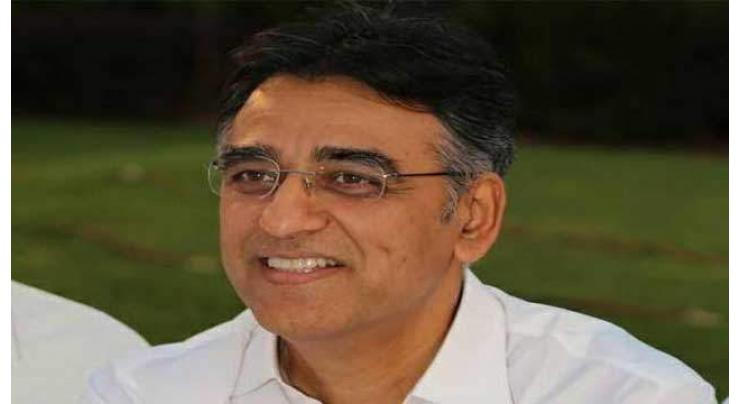
- Home
- Pakistan
- News
- It was not the fault of the last PML-N government to avail the IMF's bailout package: Finance Minist ..
It Was Not The Fault Of The Last PML-N Government To Avail The IMF's Bailout Package: Finance Minister Asad Umer
Rukhshan Mir (@rukhshanmir) Published October 13, 2018 | 10:50 PM

The finance minister said it was not the fault of the last PML-N government to avail the IMF's bailout package and similarly, now the Pakistan Tehreek-e-Insaf government was forced the approach the international lender.
FAISALABAD, (UrduPoint / Pakistan Point News - 13th Oct, 2018 ) :The finance minister said it was not the fault of the last PML-N government to avail the IMF's bailout package and similarly, now the Pakistan Tehreek-e-Insaf government was forced the approach the international lender.
Replying to a question regrading the United States' statement that Pakistan was seeking a bailout package from IMF only to repay the debts taken on account of the China Pakistan Economic Corridor, the minister said, "I categorically reject the US statement as it is a 100 percent wrong statement and there is no truth in it." He said Pakistan had to repay debt of $9 billion to the IMF this year while $ 300 million would have to be paid to China annually on account of CPEC for next few years.
"Debts for CPEC projects given by the Chinese side are based on very easy terms and conditions and Pakistan does not need any external aid to pay the same," he added.
The minister said the Pakistan government would share the details of Pakistan's foreign debts with the IMF as it was a normal routine while negotiating a package with the lender.
He said during the previous government's tenure, the IMF package was completed in September 2016 and by that time the country's foreign exchange reserves' remained stable. However, the reserves kept on falling every month since October 2016, he added.
To another question, the minister said it was possible for Pakistan to sustain without an IMF programme. However, "if we do not opt for the IMF package, the country's economic condition will further deteriorate which will ultimately affect the common men." With regard to the rupee devaluation, the minister said the devaluation did not occur due to Pakistan's decision to go for the IMF, but it happened because of the principle of demand and supply.
Continuous depletion of exchange reserves resulted in devaluation of the rupee, he added.
He also attributed the devaluation of rupee to the overall economic condition of regional and international countries. Due to fresh sanctions imposed by the United States on Iran, the global petroleum prices were increasing which resulted in increased import bill for Pakistan.
Highlighting the performance of currencies of various countries during the last six months, Asad Umar said Paksitan's Currency had devalued by 7 percent and that of India by 10.9 percent during the period. Similarly, the Turkish currency also depreciated by 34 percent, the Russian currency by 12 percent, British pound by 7 percent, and Chinese currency by 8 percent.
To a question, the minister said Saudi Arabia and the United Arab Emirates had not put any conditions on giving loan to Pakistan, which were not acceptable to the latter. The matter of deferred payment for import of crude oil to Saudi Arabia was not closed as yet, he added.
He said the government was trying its best not to pass on the burden to the poor. "We increased the gas prices only for the rich. We also did not take any revenue measures in the recent supplementary finance bill that could affect the low or lower middle income people," he added.
To another query regarding the IMF's condition to privatize the loss making State Owned Entities (SOEs), Asad Umar said the government had a plan to put the bleeding SOEs on right track and make them profitable entities.
He said the government had also no plan to cut down the number of employees of such SOEs. The main problem of those entities was corruption and bad governance, which the government was committed to resolve soon, he added.
Related Topics
Recent Stories

Sindh home minister chairs law and order meeting

Bakht Kakar orders to ensure maximum facilities in livestock sector

NEPRA concludes hearing into FCA of DISCOs for March

Junta-led Burkina Faso suspends BBC, Voice of America for two weeks

Chairman COPHC lauds MoMA’s efforts at Gwadar Port, Free Zone

CM’s aide directs steps to prevent domestic violence against women

LESCO detects 74,621 power pilferers in 220 days

Regional Police officer (RPO) Shariq Kamal Siddiqui holds open court

LESCO collects over Rs 4.36m from 189 defaulters in 24 hours

Secretary health urges public to follow precautionary measures to avoid spreadin ..

PM directs formation of committee for consultation with provinces on carbon cred ..

UAF to ink MoU with Ethiopian universities
More Stories From Pakistan
-

Sindh home minister chairs law and order meeting
24 minutes ago -

Bakht Kakar orders to ensure maximum facilities in livestock sector
24 minutes ago -

NEPRA concludes hearing into FCA of DISCOs for March
27 minutes ago -

Chairman COPHC lauds MoMA’s efforts at Gwadar Port, Free Zone
27 minutes ago -

CM’s aide directs steps to prevent domestic violence against women
29 minutes ago -

LESCO detects 74,621 power pilferers in 220 days
26 minutes ago
-

Regional Police officer (RPO) Shariq Kamal Siddiqui holds open court
26 minutes ago -

LESCO collects over Rs 4.36m from 189 defaulters in 24 hours
27 minutes ago -

Secretary health urges public to follow precautionary measures to avoid spreading dengue
27 minutes ago -

PM directs formation of committee for consultation with provinces on carbon credits policy
27 minutes ago -

UAF to ink MoU with Ethiopian universities
50 minutes ago -

Scouts playing exemplary role in serving humanity: Dr Iqrar
49 minutes ago











